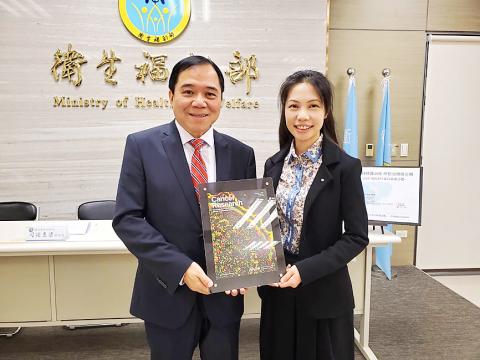A National Health Research Institutes (NHRI) research team has discovered a key mechanism that affects lung cancer metastasis, which could become a potential biomarker, the institutes said yesterday.
Cancer has been the leading cause of death in Taiwan for 37 years, with lung cancer the leading cause of cancer deaths. A significant majority of such deaths are associated with tumor metastasis.
A team led by NHRI Immunology Research Center director Tan Tse-hua (譚澤華) and assistant research fellow Chuang Huai-chia (莊懷佳) has spent years exploring the mechanism between cancer metastasis and MAP4K3 (also known as GLK), a protein encoded by the MAP4K3 gene.

Photo: Lin Hui-chin, Taipei Times
The team’s previous studies showed that up to 76 percent of non-small cell lung cancer patients have overexpression of GLK in their bodies, and that overexpression of GLK in human lung cancer is associated with poor prognosis and recurrence, Chuang said.
However, the role of GLK in cancer recurrence was unclear, she said.
Using GLK transgenic mice that were bred with genetically modified lung cancer mice allowed the team to study the effect of GLK on the progression of the disease, and they found that GLK induced lung cancer to metastasize in lymph nodes, the brain and liver, she said.
Transgenic GLK promotes tumor metastasis and cell migration through the scaffold protein IQ motif–containing GTPase-activating protein 1 (IQGAP1), by binding to, phosphorylating and activating IQGAP1, the team found.
Human tissues displayed increased phospho-IQGAP1, which correlated with poor survival, so if the overexpression of GLK is inhibited, lung cancer recurrence and tumor metastasis might be controlled, she added.
Tan said that GLK plays a crucial role in promoting cell migration and cancer metastasis by directly binding to and phosphorylating IQGAP1, so their findings suggest that the GLK–IQGAP1 complex is a potential therapeutic target for cancer recurrence.
GLK knockout (inactivated) mice have a life span about 1.5 times that of average mice, which suggests that GLK inhabitation might also have anti-aging effects, he said.
The study was published as the cover story in last month’s issue of Cancer Research and the team is applying for a patent for the findings of the GLK–IQGAP1 complex study, the NHRI said.

A Chinese aircraft carrier group entered Japan’s economic waters over the weekend, before exiting to conduct drills involving fighter jets, the Japanese Ministry of Defense said yesterday. The Liaoning aircraft carrier, two missile destroyers and one fast combat supply ship sailed about 300km southwest of Japan’s easternmost island of Minamitori on Saturday, a ministry statement said. It was the first time a Chinese aircraft carrier had entered that part of Japan’s exclusive economic zone (EEZ), a ministry spokesman said. “We think the Chinese military is trying to improve its operational capability and ability to conduct operations in distant areas,” the spokesman said. China’s growing

Nine retired generals from Taiwan, Japan and the US have been invited to participate in a tabletop exercise hosted by the Taipei School of Economics and Political Science Foundation tomorrow and Wednesday that simulates a potential Chinese invasion of Taiwan in 2030, the foundation said yesterday. The five retired Taiwanese generals would include retired admiral Lee Hsi-min (李喜明), joined by retired US Navy admiral Michael Mullen and former chief of staff of the Japan Self-Defense Forces general Shigeru Iwasaki, it said. The simulation aims to offer strategic insights into regional security and peace in the Taiwan Strait, it added. Foundation chair Huang Huang-hsiung

PUBLIC WARNING: The two students had been tricked into going to Hong Kong for a ‘high-paying’ job, which sent them to a scam center in Cambodia Police warned the public not to trust job advertisements touting high pay abroad following the return of two college students over the weekend who had been trafficked and forced to work at a cyberscam center in Cambodia. The two victims, surnamed Lee (李), 18, and Lin (林), 19, were interviewed by police after landing in Taiwan on Saturday. Taichung’s Chingshui Police Precinct said in a statement yesterday that the two students are good friends, and Lin had suspended her studies after seeing the ad promising good pay to work in Hong Kong. Lee’s grandfather on Thursday reported to police that Lee had sent

A Chinese ship ran aground in stormy weather in shallow waters off a Philippines-controlled island in the disputed South China Sea, prompting Filipino forces to go on alert, Philippine military officials said yesterday. When Philippine forces assessed that the Chinese fishing vessel appeared to have run aground in the shallows east of Thitu Island (Jhongye Island, 中業島) on Saturday due to bad weather, Philippine military and coast guard personnel deployed to provide help, but later saw that the ship had been extricated, Philippine navy regional spokesperson Ellaine Rose Collado said. No other details were immediately available, including if there were injuries among